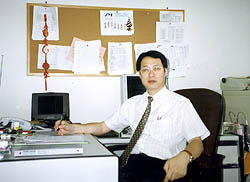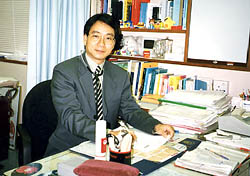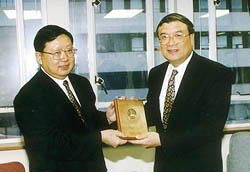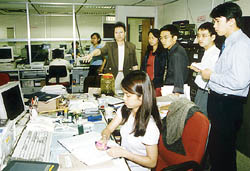



















| New Territories South regional stop smoking course | |
|
A new trial New Territories South regional stop
smoking course will be held from Monday 24 to Friday 28 August between 3:30pm and 5:00pm
at the Tsuen Wan Police Station Officers' Mess.
So for all officers in NTS who really want to quit - now is the time to register your interest. The proven course is the idea of CCI NTS Jaime Gill - and one of the first programmes to benefit from the $500,000 grant for healthy lifestyle pursuits recently announced by DCP Man Tsang Yam-pui to the Police Sports Council and overseen by the Working Group on Healthy Lifestyles. "This is a trial course initially to be given in NTS," said Mr Gill. "So, I need the assistance of all smokers who are serious about quitting to give their support by joining the course and making the NTS stop smoking scheme a resounding success worthy of Force-wide implementation, which is the ultimate goal." |
 Course convenor Dr Stephen Wu (bottom); and course co-ordinator, Aaron Liu of the Adventist Hospital five-day stop smoking plan  |
|
All commanding officers in NTS Region are requested to facilitate participation by officers of any rank (who are smokers) by arranging their duties so that they can attend the five-day stop smoking course - run by specially trained medical staff from the Tsuen Wan Adventist Hospital who have many years of experience in helping smokers give up this health destroying habit. Can they really help? According to Mr Gill (a former smoker), yes. It is now 22 years since he attended a similar five-day stop smoking course which helped him give up the nasty habit for good. As did DRC NTS Ian Nicholson and ADC Admin at Sha Tin District Andrew Li Tat-wah - he has not smoked for 18 years. "On a more recent note," said Mr Gill, "Since I started organising this course in NTS, Station Sergeant Lam Po-wah of Sha Tin Magistracy attended our recent stop smoking introductory seminar at Ma On Shan on 27 May. As a direct result of what he saw and heard he has drastically reduced his smoking and will be attending the course on 24 August to learn how to quit forever. We hope that a lot of smokers working in NTS will join him on the course. Because smoking leads to lung cancer, heart disease and early death. Quitting now increases the chance of remaining healthy and living to draw your pension for a very long time." For more information call Jaime Gill, CCI NTS: 2694-2262. | |
| |
| ACTING Commissioner
of Police Peter Wong Tsan-kwong presented Valedictory Letters, Certificates of Exemplary
Service and souvenirs to 17 retiring disciplined and civilian officers in recognition of their
exceptionally long and loyal service to the Force on 7 August at the Senior Officers' Mess in
Caine House.
The 17 officers are: Station Sergeants To Mo-man and Wong Sik-chung; Detective Sergeants Kong Chi-wing, Li Ah-cheung and Lau Kong-chi; Woman Sergeant Fu Keung San-ling; Sergeants Ha Ping-san, Pun Ping-wo and Ng Wai-keung; Woman Senior Police Constable Tse Lo Siu-mui; Senior Police Constables Cheng Kai-yip, Li Mun, Tsui Pui-chun, Cheung San-hung, Li Yun-kau and Chan Him-shing; and SCO Lee Kam-lun. Two officers, DSSgt Chu Siu-sing and Sgt Wong Kam-kwong, were out of town and unable to join the event. Total number of years of loyal service represented by this group is approximately 665. And with Mr Wong's, you're looking at close to 700 years. |

|  |
|
| Gastric Disease | ||
|
Function of the stomach. The stomach is part of the digestive system. It is at the
middle-left of the upper abdomen. Food is chewed in the mouth and then reaches the stomach
through the oesophagus. It will stay in the stomach for 2 to 5 hours where it blends with gastric
juices which digest the food. It then enters the first part of the small intestine, i.e. the duodenum.
Gastric juices consist of hydrochloric acid and digestive enzymes. The acid in gastric juice has a
strong sterilising function. The digestive enzyme is responsible for the digestion of food.
Common gastric diseases: dyspepsia, gastritis, peptic ulcers (including duodenal ulcers), and stomach cancer. Symptoms of dyspepsia: swelling of the stomach, belching, nausea or a dull pain in the stomach. Many people have symptoms of indigestion. With dyspepsia, the structure and tissue of the stomach may be normal. Sufferers should follow the instructions of doctors, improve their mode of living and relax. The symptoms should gradually disappear. The causes of acute gastritis can be: spicy and stimulating foods and beverages and may be brought on by the excessive consumption of liquor, black coffee or dark tea, pepper, curry, etc.; bacteria or viruses; and drugs such as some analgesics and anti-rheumatics. The above factors can stimulate the stomach lining directly, causing gastritis. The sufferer may feel a sudden pain of the upper abdomen (whether the stomach is empty or full). At times vomit may occur. Gastric and duodenal ulcers. The duodenum is the first part of the small intestine which connects to the outlet of the stomach which may ulcerate in a similar fashion to the stomach. Ulceration of the stomach and duodenum are medically referred to as peptic ulcers. A duodenal ulcer is more common. Gastric ulcer sand duodenal ulcers have similar causes and symptoms. They are usually caused by excessive consumption of alcohol and tobacco, irregular mealtimes, a tense lifestyle, intensive work or study, anxiety, and neurasthenia which causes hyperchlorhydria. The ulcer is formed in the stomach lining or the bulb of the duodenum. A patient's symptoms may vary from swelling of the stomach, belching, dull or acute pain in the upper abdomen or no symptoms at all. Typically, pain caused by a duodenal ulcer usually occurs when a person is hungry or asleep at night. The intake of food will usually reduce the pain. Stomach cancer is a malignant change in the tissue of the stomach. Patients are typically males over 40. Some cases are caused by chronic inflammation or ulceration of the stomach lining, or chronic gastric ulcers. The symptoms include upper abdominal pain, loss of appetite, vomiting, gastric bleeding, sudden loss of weight, etc. However, a patient may not have any symptoms at all. Treatment of stomach cancer may necessitate the removal of the stomach by surgical operation; or relieving the symptoms by medication or intake of chemotherapeutic drugs which are anticarcinogenic. Diagnosis of gastric diseases. Doctors will carry out one or more of the following examinations, depending on the patient's conditions: clinical examination, blood and stool test, x-ray examination (Barium Meal), endoscope (gastroscope), oesophagorcopy and duodenoscopy, tissue examination and/or gastric juice analysis. Prevention of gastric diseases. Adequate rest and exercise; avoidance or reduction of mental stress; improvement of lifestyle; release of tension. It is absolutely necessary to quit smoking and reduce liquor consumption; eat at regular times without over or under-eating while avoiding food that is sour and too stimulating. Medication, especially analgesics and anti-rheumatics, should not be taken arbitrarily. The treatments for gastritis and peptic ulcers (including duodenal ulcers) are quite similar Ал with the course of treatment for gastritis and duodentis running two to three weeks while that for the ulcer takes about six weeks to three months. Medication for treatment functions to neutralise the hydrochloric acid in gastric juices; reduce the secretion of hydrochloric acid; reduce gastro-intestinal muscle spasms; and speed up the recovery of an ulcer. In some cases treatment must involve a surgical operation (which is usually used to tackle the complication of ulcers). However, in the past ten years, medication for curing ulcers has become quite effective. Non-smoker duodenal ulcer patients usually take medication for 6 weeks and have an 80 per cent chance of recovery. Smokers need twice the time. Information for Health is Wealth is provided by doctors and health care professionals of the Hong Kong Medical Association (co-ordinated by Administration and Support Group, Personnel Services Branch, Hong Kong Police). They look forward to receiving (and will try to answer any questions you have) on gastric disease. Please fax: 2865-4799. | ||
| Health is Wealth reader feedback | ||
|
[The following response to queries is provided by Dr Wong Shou-pang of the Hong Kong
Medical Association]
PHYSICAL training in the Force is
quite demanding. What is the way of prevent the occurrence of coronary heart disease and
other heart diseases during training?
I ALWAYS feel enormous pressure from work. Does psychological pressure
increase the chances of contraction heart diseases?
WHILE on street patrol, if I come across a person with symptoms of a sudden
heart attack, can I apply cardiopulmonary resuscitation to them?
I WAS a smoker for over 10 years but have quit. Are the chances of my contracting
coronary heart diseases reduced?
I'VE had hypertension for 13 years, I sought medical treatment immediately when
I had heartache and tachycardia in 1995. My doctor said that I had cardiac arrhythmia. Now,
when I sleep I feel dizzy because of angina pectoris, but then feel better a few minutes later,
Is it related to cardiac arrhythmia?
| ||
| Guangdong Provincial People's Procuratorate meet CP | |

| A NINE-MEMBER delegation from the Guangdong Provincial People's Procuratorate (GDPP) led by Chief Procurator Zhang Xue-jun paid a courtesy visit to the Commissioner of Police Eddie Hui on 7 August. The delegation then had a tour of the Identification Bureau and the Ballistics and Firearms Identification Bureau. |
| Western Australian Anti-corruption Committee pays a visit | |
| RECENTLY an eight-member delegation from the Western Australian Anti-Corruption Committee paid a visit to the Hong Kong Police Force. The Australians met SACP Dick Lee Ming-kwai to discuss Force strategies on anti-corruption. They then called on the Police Training School and were briefed by its Commandant Wong Doon-yee on the Force's Vision and Statement of Common Purpose and Values. The delegation also visited the Queensway Recruiting Centre. |

|
| University Students get an idea of the scope of the Hong Kong Police | |

| A TEAM of University of Hong Kong students (two local and two from the mainland) participating in a socio-economic study project whose theme is "How to develop and maintain a quality police force", recently called on the Police Public Relations Branch where they were briefed on its structure and work. To further enhance their understanding of the Force they are scheduled to visit more formations including the Police Dog Unit, the Weapons Training Division, the Police Tactical Unit, the Liaison Bureau and the Information Technology Branch. |

